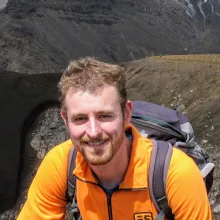
Sedimentary basins: Windows into the dynamics of Australian lithosphere
This research program explores the geodynamic history recorded by sedimentary basins and its influence on lithospheric architecture, geological processes, and critical mineral systems.
Project status
Content navigation
About
Sedimentary basins refer to long-lived depressions in the surface of the crust that steadily accumulate sediments. They cover much of Earth’s surface, including approximately three-quarters of the Australian continent, and host large quantities of natural resources including hydrocarbons, groundwater aquifers, hydrogen, helium, and critical mineral systems. They can form under a variety of geodynamic settings and their mechanism of formation is critical in controlling the types of resource that they may host. Improving our understanding of sedimentary basin genesis is therefore crucial for underpinning successful exploration efforts, particularly in frontier regions such as basins that are hidden beneath younger cover.

The research undertaken within this program concerns integrating observational datasets obtained from sedimentology, geophysical imaging, geochemistry, and geochronology to comprehensively reconstruct the history of sedimentation within any given basin and assess its relationship to lithospheric architecture. We combine fieldwork, laboratory analyses, and numerical modelling methods to produce models of paleodepositional environments and basin genesis. Insights into geodynamic formation mechanisms and associated thermal histories are then used to guide predictions of potential resource distributions.
The basins that we study range from Cenozoic examples right back to Proterozoic systems, such as the Mount Isa superbasin in northern Australia. We collaborate with other academics, state, and federal institutions including the Geological Survey of Queensland, the Northern Territory Geological Survey, Geoscience Australia, and the United States Geological Survey. We have roles for Earth scientists from a range of backgrounds including sedimentology, geophysics, and numerical modelling. Please don’t hesitate to contact us if you are interested in undertaking a research project in this space.





